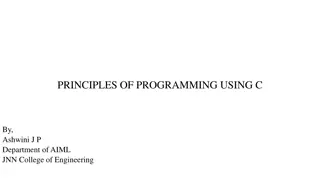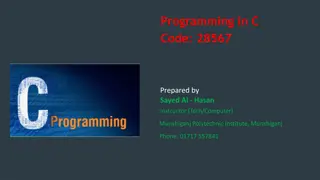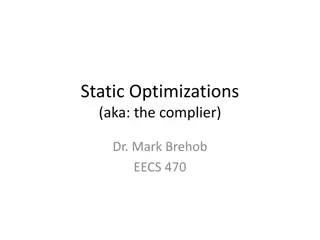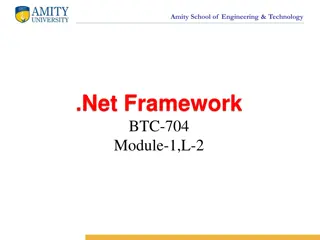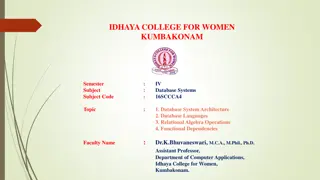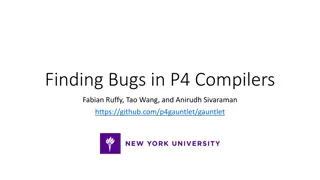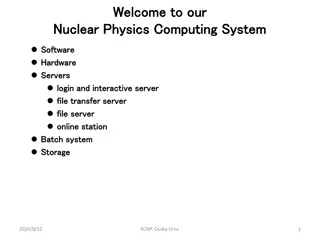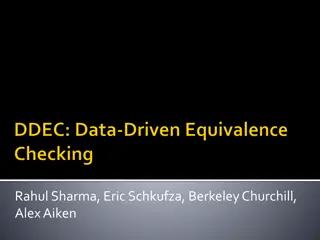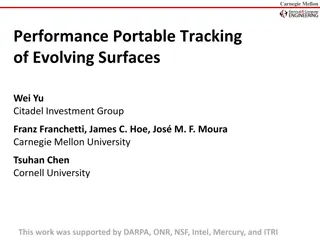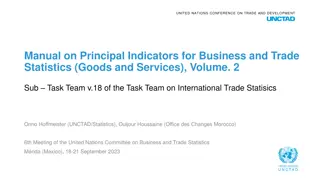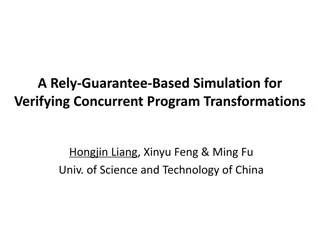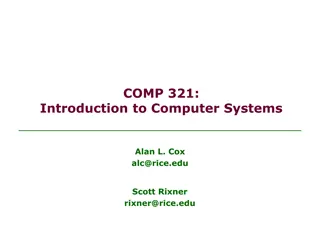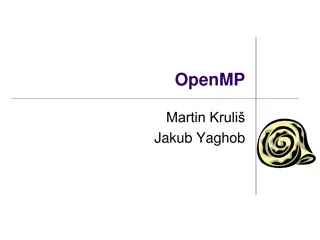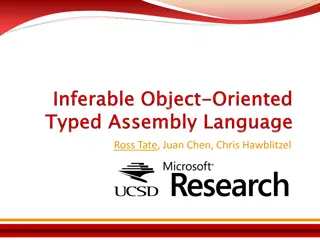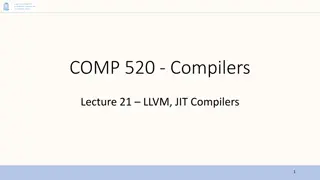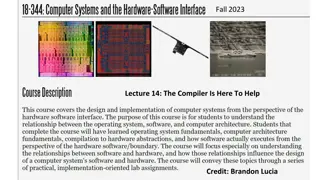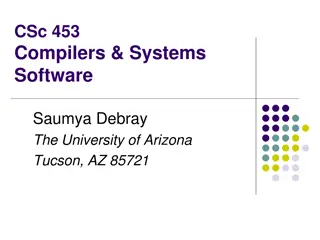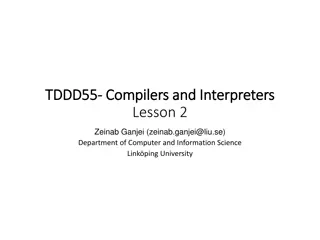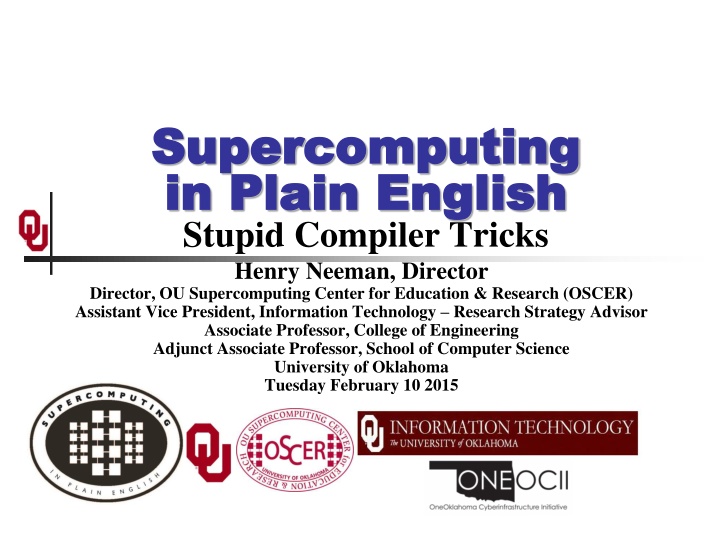
Supercomputing in Plain English: Compilers and Videoconferencing Tips
Join the discussion on supercomputing and compiler tricks with expert Henry Neeman. Learn about the nature of videoconferences, connection tips, and the importance of muting. Make sure to register and download slides in advance for a seamless experience.
Download Presentation

Please find below an Image/Link to download the presentation.
The content on the website is provided AS IS for your information and personal use only. It may not be sold, licensed, or shared on other websites without obtaining consent from the author. If you encounter any issues during the download, it is possible that the publisher has removed the file from their server.
You are allowed to download the files provided on this website for personal or commercial use, subject to the condition that they are used lawfully. All files are the property of their respective owners.
The content on the website is provided AS IS for your information and personal use only. It may not be sold, licensed, or shared on other websites without obtaining consent from the author.
E N D
Presentation Transcript
Supercomputing Supercomputing in Plain English in Plain English Stupid Compiler Tricks Henry Neeman, Director Director, OU Supercomputing Center for Education & Research (OSCER) Assistant Vice President, Information Technology Research Strategy Advisor Associate Professor, College of Engineering Adjunct Associate Professor, School of Computer Science University of Oklahoma Tuesday February 10 2015
This is an experiment! It s the nature of these kinds of videoconferences that FAILURES ARE GUARANTEED TO HAPPEN! NO PROMISES! So, please bear with us. Hopefully everything will work out well enough. If you lose your connection, you can retry the same kind of connection, or try connecting another way. Remember, if all else fails, you always have the toll free phone bridge to fall back on. Supercomputing in Plain English: Compilers Tue Feb 10 2015 2
PLEASE MUTE YOURSELF No matter how you connect, PLEASE MUTE YOURSELF, so that we cannot hear you. At OU, we will turn off the sound on all conferencing technologies. That way, we won t have problems with echo cancellation. Of course, that means we cannot hear questions. So for questions, you ll need to send e-mail. PLEASE MUTE YOURSELF. PLEASE MUTE YOURSELF. Supercomputing in Plain English: Compilers Tue Feb 10 2015 3
PLEASE REGISTER If you haven t already registered, please do so. You can find the registration link on the SiPE webpage: http://www.oscer.ou.edu/education/ Our ability to continue providing Supercomputing in Plain English depends on being able to show strong participation. We use our headcounts, institution counts and state counts (since 2001, over 2000 served, from every US state except RI and VT, plus 17 other countries, on every continent except Australia and Antarctica) to improve grant proposals. Supercomputing in Plain English: Compilers Tue Feb 10 2015 4
Download the Slides Beforehand Before the start of the session, please download the slides from the Supercomputing in Plain English website: http://www.oscer.ou.edu/education/ That way, if anything goes wrong, you can still follow along with just audio. PLEASE MUTE YOURSELF. Supercomputing in Plain English: Compilers Tue Feb 10 2015 5
H.323 (Polycom etc) #1 If you want to use H.323 videoconferencing for example, Polycom then: If you AREN T registered with the OneNet gatekeeper (which is probably the case), then: Dial164.58.250.51 Bring up the virtual keypad. On some H.323 devices, you can bring up the virtual keypad by typing: # (You may want to try without first, then with; some devices won't work with the #, but give cryptic error messages about it.) When asked for the conference ID, or if there's no response, enter: 0409 On most but not all H.323 devices, you indicate the end of the ID with: # Supercomputing in Plain English: Compilers Tue Feb 10 2015 6
H.323 (Polycom etc) #2 If you want to use H.323 videoconferencing for example, Polycom then: If you ARE already registered with the OneNet gatekeeper (most institutions aren t), dial: 2500409 Many thanks to James Deaton, Skyler Donahue, Jeremy Wright and Steven Haldeman of OneNet for providing this. PLEASE MUTE YOURSELF. Supercomputing in Plain English: Compilers Tue Feb 10 2015 7
Wowza #1 You can watch from a Windows, MacOS or Linux laptop using Wowza from the following URL: http://jwplayer.onenet.net/stream6/sipe.html Wowza behaves a lot like YouTube, except live. Many thanks to James Deaton, Skyler Donahue, Jeremy Wright and Steven Haldeman of OneNet for providing this. PLEASE MUTE YOURSELF. Supercomputing in Plain English: Compilers Tue Feb 10 2015 8
Wowza #2 Wowza has been tested on multiple browsers on each of: Windows (7 and 8): IE, Firefox, Chrome, Opera, Safari MacOS X: Safari, Firefox Linux: Firefox, Opera We ve also successfully tested it on devices with: Android iOS However, we make no representations on the likelihood of it working on your device, because we don t know which versions of Android or iOS it mi PLEASE MUTE YOURSELF. ght or might not work with. Tue Feb 10 2015 Supercomputing in Plain English: Compilers 9
Toll Free Phone Bridge IF ALL ELSE FAILS, you can use our toll free phone bridge: 800-832-0736 * 623 2874 # Please mute yourself and use the phone to listen. Don t worry, we ll call out slide numbers as we go. Please use the phone bridge ONLY if you cannot connect any other way: the phone bridge can handle only 100 simultaneous connections, and we have over 500 participants. Many thanks to OU CIO Loretta Early for providing the toll free phone bridge. PLEASE MUTE YOURSELF. Supercomputing in Plain English: Compilers Tue Feb 10 2015 10
Please Mute Yourself No matter how you connect, PLEASE MUTE YOURSELF, so that we cannot hear you. (For Wowza, you don t need to do that, because the information only goes from us to you, not from you to us.) At OU, we will turn off the sound on all conferencing technologies. That way, we won t have problems with echo cancellation. Of course, that means we cannot hear questions. So for questions, you ll need to send e-mail. PLEASE MUTE YOURSELF. PLEASE MUTE YOURSELF. Supercomputing in Plain English: Compilers Tue Feb 10 2015 11
Questions via E-mail Only Ask questions by sending e-mail to: sipe2015@gmail.com All questions will be read out loud and then answered out loud. PLEASE MUTE YOURSELF. Supercomputing in Plain English: Compilers Tue Feb 10 2015 12
Onsite: Talent Release Form If you re attending onsite, you MUST do one of the following: complete and sign the Talent Release Form, OR sit behind the cameras (where you can t be seen) and don t talk at all. If you aren t onsite, then PLEASE MUTE YOURSELF. Supercomputing in Plain English: Compilers Tue Feb 10 2015 13
TENTATIVE Schedule Tue Jan 20: Overview: What the Heck is Supercomputing? Tue Feb 3: The Tyranny of the Storage Hierarchy Tue Feb 3: Instruction Level Parallelism Tue Feb 10: Stupid Compiler Tricks Tue Feb 17: Shared Memory Multithreading Tue Feb 24: Distributed Multiprocessing Tue March 3: Applications and Types of Parallelism Tue March 10: Multicore Madness Tue March 17: NO SESSION (OU's Spring Break) Tue March 24: NO SESSION (Henry has a huge grant proposal due) Tue March 31: High Throughput Computing Tue Apr 7: GPGPU: Number Crunching in Your Graphics Card Tue Apr 14: Grab Bag: Scientific Libraries, I/O Libraries, Visualization Supercomputing in Plain English: Compilers Tue Feb 10 2015 14
Thanks for helping! OU IT OSCER operations staff (Brandon George, Dave Akin, Brett Zimmerman, Josh Alexander, Patrick Calhoun) Horst Severini, OSCER Associate Director for Remote & Heterogeneous Computing Debi Gentis, OSCER Coordinator Jim Summers The OU IT network team James Deaton, Skyler Donahue, Jeremy Wright and Steven Haldeman, OneNet Kay Avila, U Iowa Stephen Harrell, Purdue U Supercomputing in Plain English: Compilers Tue Feb 10 2015 15
This is an experiment! It s the nature of these kinds of videoconferences that FAILURES ARE GUARANTEED TO HAPPEN! NO PROMISES! So, please bear with us. Hopefully everything will work out well enough. If you lose your connection, you can retry the same kind of connection, or try connecting another way. Remember, if all else fails, you always have the toll free phone bridge to fall back on. PLEASE MUTE YOURSELF. Supercomputing in Plain English: Compilers Tue Feb 10 2015 16
Coming in 2015! Linux Clusters Institute workshop May 18-22 2015 @ OU http://www.linuxclustersinstitute.org/workshops/ Great Plains Network Annual Meeting, May 27-29, Kansas City Advanced Cyberinfrastructure Research & Education Facilitators (ACI-REF) Virtual Residency May 31 - June 6 2015 XSEDE2015, July 26-30, St. Louis MO https://conferences.xsede.org/xsede15 IEEE Cluster 2015, Sep 23-27, Chicago IL http://www.mcs.anl.gov/ieeecluster2015/ OKLAHOMA SUPERCOMPUTING SYMPOSIUM 2015, Sep 22-23 2015 @ OU SC13, Nov 15-20 2015, Austin TX http://sc15.supercomputing.org/ PLEASE MUTE YOURSELF. Supercomputing in Plain English: Compilers Tue Feb 10 2015 17
Outline Dependency Analysis What is Dependency Analysis? Control Dependencies Data Dependencies Stupid Compiler Tricks Tricks the Compiler Plays Tricks You Play With the Compiler Profiling Supercomputing in Plain English: Compilers Tue Feb 10 2015 18
What Is Dependency Analysis? Dependency analysis describes of how different parts of a program affect one another, and how various parts require other parts in order to operate correctly. A control dependency governs how different sequences of instructions affect each other. A data dependency governs how different pieces of data affect each other. Much of this discussion is from references [1] and [6]. Supercomputing in Plain English: Compilers Tue Feb 10 2015 20
Control Dependencies Every program has a well-defined flow of control that moves from instruction to instruction to instruction. This flow can be affected by several kinds of operations: Loops Branches (if, select case/switch) Function/subroutine calls I/O (typically implemented as calls) Dependencies affect parallelization! Supercomputing in Plain English: Compilers Tue Feb 10 2015 21
Branch Dependency (F90) y = 7 IF (x <= 2) THEN y = 3 END IF z = y + 1 Note that (x <= 2)means x less than or equal to two. The value of y depends on what the condition (x <= 2) evaluates to: If the condition (x <= 2)evaluates to.TRUE., then y is set to 3, sozis assigned4. Otherwise, y remains 7, sozis assigned8. https://en.wikipedia.org/wiki/Dependence_analysis Supercomputing in Plain English: Compilers Tue Feb 10 2015 22
Branch Dependency (C) y = 7; if (x <= 2) { y = 3; } z = y + 1 Note that (x <= 2)means x less than or equal to two. The value of y depends on what the condition (x != 0) evaluates to: If the condition (x <= 2)evaluates totrue, then y is set to 3, sozis assigned4. Otherwise, y remains 7, sozis assigned8. https://en.wikipedia.org/wiki/Dependence_analysis Supercomputing in Plain English: Compilers Tue Feb 10 2015 23
Loop Carried Dependency (F90) DO i = 2, length a(i) = a(i-1) + b(i) END DO Here, each iteration of the loop depends on the previous: iteration i=3 depends on iteration i=2, iteration i=4 depends on iteration i=3, iteration i=5 depends on iteration i=4, etc. This is sometimes called a loop carried dependency. There is no way to execute iteration i until after iteration i-1 has completed, so this loop can t be parallelized. Supercomputing in Plain English: Compilers Tue Feb 10 2015 24
Loop Carried Dependency (C) for (i = 1; i < length; i++) { a[i] = a[i-1] + b[i]; } Here, each iteration of the loop depends on the previous: iteration i=3 depends on iteration i=2, iteration i=4 depends on iteration i=3, iteration i=5 depends on iteration i=4, etc. This is sometimes called a loop carried dependency. There is no way to execute iteration i until after iteration i-1 has completed, so this loop can t be parallelized. Supercomputing in Plain English: Compilers Tue Feb 10 2015 25
Why Do We Care? Loops are the favorite control structures of High Performance Computing, because compilers know how to optimize their performance using instruction-level parallelism: superscalar, pipelining and vectorization can give excellent speedup. Loop carried dependencies affect whether a loop can be parallelized, and how much. Supercomputing in Plain English: Compilers Tue Feb 10 2015 26
Loop or Branch Dependency? (F) Is this a loop carried dependency or a branch dependency? DO i = 1, length IF (x(i) /= 0) THEN y(i) = 1.0 / x(i) END IF END DO Supercomputing in Plain English: Compilers Tue Feb 10 2015 27
Loop or Branch Dependency? (C) Is this a loop carried dependency or a branch dependency? for (i = 0; i < length; i++) { if (x[i] != 0) { y[i] = 1.0 / x[i]; } } Supercomputing in Plain English: Compilers Tue Feb 10 2015 28
Call Dependency Example (F90) x = 5 y = myfunction(7) z = 22 The flow of the program is interrupted by the call to myfunction, which takes the execution to somewhere else in the program. It s similar to a branch dependency. Supercomputing in Plain English: Compilers Tue Feb 10 2015 29
Call Dependency Example (C) x = 5; y = myfunction(7); z = 22; The flow of the program is interrupted by the call to myfunction, which takes the execution to somewhere else in the program. It s similar to a branch dependency. Supercomputing in Plain English: Compilers Tue Feb 10 2015 30
I/O Dependency (F90) x = a + b PRINT *, x y = c + d Typically, I/O is implemented by hidden subroutine calls, so we can think of this as equivalent to a call dependency. Supercomputing in Plain English: Compilers Tue Feb 10 2015 31
I/O Dependency (C) x = a + b; printf("%f", x); y = c + d; Typically, I/O is implemented by hidden subroutine calls, so we can think of this as equivalent to a call dependency. Supercomputing in Plain English: Compilers Tue Feb 10 2015 32
Reductions Arent Dependencies array_sum = 0 DO i = 1, length array_sum = array_sum + array(i) END DO A reduction is an operation that converts an array to a scalar. Other kinds of reductions: product, .AND., .OR., minimum, maximum, index of minimum, index of maximum, number of occurrences of a particular value, etc. Reductions are so common that hardware and compilers are optimized to handle them. Also, they aren t really dependencies, because the order in which the individual operations are performed doesn t matter. Supercomputing in Plain English: Compilers Tue Feb 10 2015 33
Reductions Arent Dependencies array_sum = 0; for (i = 0; i < length; i++) { array_sum = array_sum + array[i]; } A reduction is an operation that converts an array to a scalar. Other kinds of reductions: product, &&, ||, minimum, maximum, index of minimum, index of maximum, number of occurrences of a particular value, etc. Reductions are so common that hardware and compilers are optimized to handle them. Also, they aren t really dependencies, because the order in which the individual operations are performed doesn t matter. Supercomputing in Plain English: Compilers Tue Feb 10 2015 34
Data Dependencies (F90) A data dependence occurs when an instruction is dependent on data from a previous instruction and therefore cannot be moved before the earlier instruction [or executed in parallel]. [7] a = x + y + cos(z) b = a * c The value of b depends on the value of a, so these two statements must be executed in order. Supercomputing in Plain English: Compilers Tue Feb 10 2015 35
Data Dependencies (C) A data dependence occurs when an instruction is dependent on data from a previous instruction and therefore cannot be moved before the earlier instruction [or executed in parallel]. [7] a = x + y + cos(z); b = a * c; The value of b depends on the value of a, so these two statements must be executed in order. Supercomputing in Plain English: Compilers Tue Feb 10 2015 36
Output Dependencies (F90) x = a / b y = x + 2 x = d e Notice that x is assigned two different values, but only one of them is retained after these statements are done executing. In this context, the final value of xis the output. Again, we are forced to execute in order. Supercomputing in Plain English: Compilers Tue Feb 10 2015 37
Output Dependencies (C) x = a / b; y = x + 2; x = d e; Notice that x is assigned two different values, but only one of them is retained after these statements are done executing. In this context, the final value of xis the output. Again, we are forced to execute in order. Supercomputing in Plain English: Compilers Tue Feb 10 2015 38
Why Does Order Matter? Dependencies can affect whether we can execute a particular part of the program in parallel. If we cannot execute that part of the program in parallel, then it ll be SLOW. Supercomputing in Plain English: Compilers Tue Feb 10 2015 39
Loop Dependency Example if ((dst == src1) && (dst == src2)) { for (index = 1; index < length; index++) { dst[index] = dst[index-1] + dst[index]; } } else if (dst == src1) { for (index = 1; index < length; index++) { dst[index] = dst[index-1] + src2[index]; } } else if (dst == src2) { for (index = 1; index < length; index++) { dst[index] = src1[index-1] + dst[index]; } } else if (src1 == src2) { for (index = 1; index < length; index++) { dst[index] = src1[index-1] + src1[index]; } } else { for (index = 1; index < length; index++) { dst[index] = src1[index-1] + src2[index]; } } Supercomputing in Plain English: Compilers Tue Feb 10 2015 40
Loop Dep Example (contd) if ((dst == src1) && (dst == src2)) { for (index = 1; index < length; index++) { dst[index] = dst[index-1] + dst[index]; } } else if (dst == src1) { for (index = 1; index < length; index++) { dst[index] = dst[index-1] + src2[index]; } } else if (dst == src2) { for (index = 1; index < length; index++) { dst[index] = src1[index-1] + dst[index]; } } else if (src1 == src2) { for (index = 1; index < length; index++) { dst[index] = src1[index-1] + src1[index]; } } else { for (index = 1; index < length; index++) { dst[index] = src1[index-1] + src2[index]; } } The various versions of the loop either: do have loop carried dependencies, or don t have loop carried dependencies. Supercomputing in Plain English: Compilers Tue Feb 10 2015 41
Loop Dependency Performance Loop Carried Dependency Performance 200 Better 180 160 140 MFLOPs Pentium3 500 MHz POWER4 Pentium4 2GHz EM64T 3.2 GHz 120 100 80 60 40 20 0 dst=dst+dst dst=src1+dst dst=dst+src2 dst=src1+src2 dst=src1+src1 Supercomputing in Plain English: Compilers Tue Feb 10 2015 42
Stupid Compiler Tricks
Stupid Compiler Tricks Tricks Compilers Play Scalar Optimizations Loop Optimizations Inlining Tricks You Can Play with Compilers Profiling Hardware counters Supercomputing in Plain English: Compilers Tue Feb 10 2015 44
Compiler Design The people who design compilers have a lot of experience working with the languages commonly used in High Performance Computing: Fortran: 50+ years C: 40+ years C++: almost 30 years, plus C experience So, they ve come up with clever ways to make programs run faster. Supercomputing in Plain English: Compilers Tue Feb 10 2015 45
Scalar Optimizations Copy Propagation Constant Folding Dead Code Removal Strength Reduction Common Subexpression Elimination Variable Renaming Loop Optimizations Not every compiler does all of these, so it sometimes can be worth doing these by hand. Much of this discussion is from [2] and [6]. Supercomputing in Plain English: Compilers Tue Feb 10 2015 47
Copy Propagation (F90) x = y z = 1 + x Before Has data dependency Compile x = y z = 1 + y After No data dependency Supercomputing in Plain English: Compilers Tue Feb 10 2015 48
Copy Propagation (C) x = y; z = 1 + x; Before Has data dependency Compile x = y; z = 1 + y; After No data dependency Supercomputing in Plain English: Compilers Tue Feb 10 2015 49
Constant Folding (F90) After Before add = 100 aug = 200 sum = add + aug sum = 300 Notice thatsum is actually the sum of two constants, so the compiler can precalculate it, eliminating the addition that otherwise would be performed at runtime. Supercomputing in Plain English: Compilers Tue Feb 10 2015 50

